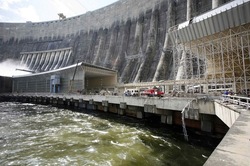
Attack on Kabardino-Balkaria Hydroelectric Plant Exposes Government’s Weakness
Publication: Eurasia Daily Monitor Volume: 7 Issue: 143
By:

On July 21, a group of militants in Kabardino-Balkaria launched a bold attack on the Baksan hydroelectric plant, ransacked the facility and rendering it unusable after a series of explosions. Two policemen who were guarding the plant were killed in the raid. The attack drew significant attention from the Russian government and media. Gazeta.ru called the attack the first successful assault of the insurgency on a strategic object in Russia (www.gazeta.ru, July 21). Geidar Jemal, the Chairman of Russia’s Islamic Committee, considered the assault to be “a huge scandal around the impossibility of holding these Olympic Games [in neighboring Sochi]” (Kommersant, July 21).
Despite the fact that the destruction of the hydroelectric plant did not lead to a major disruption in the supply of electricity to Kabardino-Balkaria, the Russian government’s reaction was unusually brusque and nervous. It became a moment of truth for Moscow’s envoy to the North Caucasus, Aleksandr Khloponin, who has faced his greatest crisis so far since being dispatched to the region in January 2010. Khloponin used the harshest and the most informal words, calling the insurgents “brutalized louts,” which probably betrayed his exasperation and despair with the destabilization that is unfolding in the region of his responsibility. However, perhaps the single most important blunder Khloponin made was when he suggested that Cossacks should be assigned to guard vulnerable infrastructure sites in Kabardino-Balkaria (Kommersant, July 21).
Khloponin’s statement has the great potential to have an incendiary effect in this multiethnic region, where ethnic Russians comprise 25 percent of the general population, which is approaching one million, while the Kabardins, aka Circassians, comprise 55 percent of the population and the Turkic-speaking Balkars make up 12 percent. Khloponin’s proposal means that Moscow regards ethnic Russians as its only loyal and trustworthy subjects in Kabardino-Balkaria, automatically putting them at loggerheads with the rest of the local population. Khloponin is unlikely to proceed with his shallow-minded plan to install the Cossacks as some sort of new regional elite; nevertheless, his remark showed his nervousness and poor knowledge of the region.
President, Dmitry Medvedev, contributed to the range of misplaced government reactions. He demanded that the law enforcement agencies and businesses do everything they can to prevent future attacks. He threatened that if such an attack were to happen again, “not one of the heads of the law enforcement agencies and companies would remain in place. All would be fired” (ITAR-TASS, July 22). The problem with this statement is that now, if somebody wants to get rid of a certain official figure in Kabardino-Balkaria and beyond, he might be tempted to bribe the insurgents to launch another attack of similar scope.
In fact, the President of Kabardino-Balkaria, Arsen Kanokov, may well have been the main target of the attack on the Baksan hydroelectric plant himself. Kanokov’s first presidential term runs out in September 2010. According to Khloponin, the uncertainty about the future of presidency in Kabardino-Balkaria and the latest attack were directly linked (www.kavkaz-uzel.ru, July 22). Earlier, on July 9, Arsen Kanokov had stated that destabilization of the situation in the republic had to do with his expiring term and certain shadowy forces were trying to show Moscow that he did not control the situation in the republic and thereby prevent him from being elected to a second presidential term (www.kavkaz-uzel.ru, July 10).
The police designated the head of the Baksan jamaat, 31-year-old Kazbek Tashuev (aka Abdul-Jabbar) as the primary suspect in organizing the attack on the Baksan hydroelectric plant. The situation in the republic has dramatically deteriorated following the March 24 killing of the leader of Kabardin jamaat, Anzor Astemirov. Attacks are now occurring on a routine daily basis in what had been a previously relatively quiet corner of the North Caucasus. Official statistics indicate that since the beginning of 2010, law enforcement personnel have been the target of 40 insurgent attacks that left 14 servicemen dead and an equal number wounded (Kommersant, July 22).
There are several sources of discontent breeding violence in Kabardino-Balkaria. First, violent actions have replaced the participatory political process, as elections for local governors were abolished by Moscow in 2004 and the electoral institutions degraded. Second, the issue of the 2014 Sochi Olympics, which Circassians connect to the issue of the Circassian “genocide,” given that Sochi was inhabited by Circassians who were partly exterminated and deported as the Russian empire encroached on their lands in the nineteenth century. Third, the rising Islamic consciousness of the local Muslim populations is coming into conflict with a fervently secularist Russian state that at the same time tends to discriminate in favor of the Russian Orthodox Church. In addition, there is a simmering interethnic rift between the Kabardins and the Balkars, deriving from the issue of land ownership, which has a strong ethnic connotation in this comparatively densely populated area.
The militant insurgency in Kabardino-Balkaria has become so strong in recent months that businesses reportedly are now required to pay the insurgents money “for jihad” in order to continue functioning safely. Insurgents have attacked alcohol sellers in Baksan in the past, while unknown assailants have attacked relatives of the militant leaders.
In February 2010, Doku Umarov, the leader of the Caucasus Emirate, of which the Kabardin jamaat is a part, announced a campaign of targeting infrastructure across Russia. The attack on the hydroelectric plant in Kabardino-Balkaria confirmed the seriousness of Umarov’s threat and is likely to lead to increased security measures across the North Caucasus, especially against regional industrial sites. The Russian government’s new strategy of working for the rapid economic development of the North Caucasus and the consequent appointment of Aleksandr Khloponin as Moscow’s envoy to the region was severely undermined as a result of the recent attack. The ability of the Russian security services to control all of the potentially vulnerable objects as well as hazardous materials may have natural constraints that make the safety issue ever more relevant in the North Caucasus and beyond.




